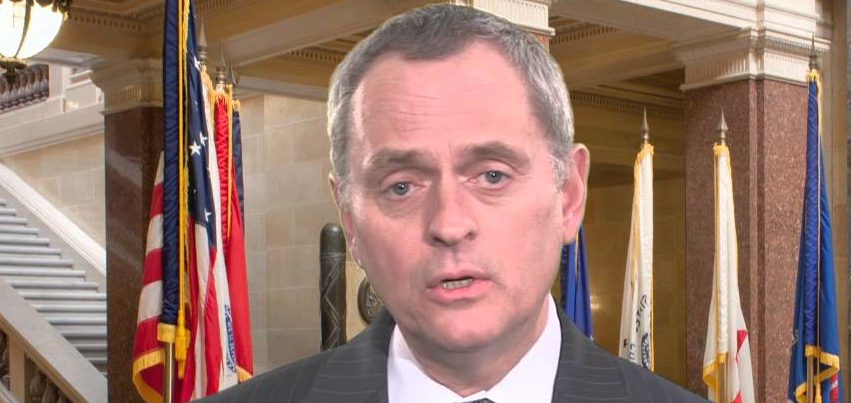 [bctt tweet=”Gov. Evers is fundamentally mistaken in his dependence on the gas tax as a reliable way to address transportation funding for the future – @RepSanfelippo #wiright #wipolitics ” username=”MacIverWisc”]
[bctt tweet=”Gov. Evers is fundamentally mistaken in his dependence on the gas tax as a reliable way to address transportation funding for the future – @RepSanfelippo #wiright #wipolitics ” username=”MacIverWisc”]
April 24, 2019
Special Guest Perspective by Rep. Joe Sanfelippo
MADISON, Wis. – One of the clearest lessons from last fall’s election was that the people of Wisconsin demand better roads. Although local jurisdictions are actually responsible for maintaining the majority of the roads that the average citizen encounters on a daily basis, the state is nevertheless the target of Wisconsinites’ scorn when it comes to bad road conditions. It is that view that made our roadways such a central issue in that election.
The nonpartisan Legislative Fiscal Bureau estimates that Wisconsin collects around $1 billion in sales tax revenue annually from the sale of automobiles and related parts and services, all of which currently goes to the state’s general fund.
Recognizing the fact that the salience of this issue helped deliver him the election, Gov. Tony Evers included a hefty gas tax increase in his proposed budget to pay for transportation initiatives. Additionally, the governor proposes to further raise the gas tax by restoring automatic indexing, which would result in annual increases to keep up with inflation.
Gov. Evers is fundamentally mistaken in his dependence on the gas tax as a reliable way to address transportation funding for the future: it is nearly universally understood that gas taxes are a diminishing source of revenue, due to lower fuel consumption by newer cars and the shift towards hybrid and electric vehicles. Notwithstanding that fact, the governor’s proposal faces a more pressing obstacle: a gas tax increase is wildly unpopular, as shown by last week’s Marquette University Law School Poll showing that 57 percent of Wisconsinites oppose raising the gas tax.
Not surprisingly, the governor has said that he is unconcerned with the poll results. Due to his misguided adherence to the liberal dogma that revenue must come from raising taxes, the governor fails to recognize that there are many better ways to address the transportation funding problem without resorting to a tax increase that would disproportionately harm lower- and middle-class families for whom higher gas prices would represent a greater percentage of their income.
A more conservative way forward would allow Wisconsin to consistently put more money towards transportation without resorting to new taxation, while also resulting in a more efficient Department of Transportation and less borrowing, due to stable and reliable funding.
The nonpartisan Legislative Fiscal Bureau estimates that Wisconsin collects around $1 billion in sales tax revenue annually from the sale of automobiles and related parts and services, all of which currently goes to the state’s general fund. Transferring a portion of this revenue into the transportation fund over time would give it a stable and sustainable funding source without putting a hole in the state budget and jeopardizing other programs. Critically, this would make money available to begin substantially reducing Wisconsin’s reliance on bonding for road construction projects. As a result, money that would otherwise be used for debt service would, instead, be available for additional transportation program funding. That’s a common-sense approach that Wisconsin should strive to achieve.
Any honest discussion of Wisconsin’s transportation issues has to acknowledge the role that the waste and inefficiency in the sprawling state Department of Transportation plays. Consequently, a central component of this plan is ensuring that the DOT continues to implement the operational reforms that commenced under the previous DOT secretary to begin addressing these structural problems within the agency. In tandem with dedicating more funds for transportation, we must pass legislation that reforms the way that the department conducts its business on a day-to-day basis and, also, properly aligns its long-term planning with its long-term needs.
The past eight years of conservative government have demonstrated that it is, indeed, possible to lower taxes, while still reducing unemployment, increasing tax collections, and growing the state’s economy to historic levels.
Such reform legislation must also include new ways for the DOT to plan and implement large construction projects more efficiently by using so-called “alternative delivery methods,” like design–build, for projects where they can save time and money. Another key reform would be to prohibit the department from awarding contracts when there is only one bidder and that bid is substantially greater than the agency’s estimated cost. Finally, there must be a top-down effort to eliminate bloat within the agency, particularly in management positions, by right-sizing the amount of personnel that the agency employs.
All of this comprehensive reform of our state’s transportation can be accomplished within the current levels of expected revenue growth from future budgets without raising new taxes. Gov. Evers and his supporters need to raise taxes to achieve their goals because they would rather use that projected revenue growth to expand the government instead of using it to address the problem. They maintain that this conservative approach will not work, but the evidence suggests otherwise.
The past eight years of conservative government have demonstrated that it is, indeed, possible to lower taxes, while still reducing unemployment, increasing tax collections, and growing the state’s economy to historic levels. Those who favor a tax-and-spend approach will oppose this proposal because it will limit their ability to grow the size and reach of government. Nevertheless, it is imperative upon the Legislature to stand up to that opposition and demonstrate that conservative principles are effective for solving problems by creating a sustainable Department of Transportation without raising taxes.
Joe Sanfelippo is a Republican member of the Wisconsin State Assembly, representing the 15th Assembly District. He was first elected to the position in November 2012.